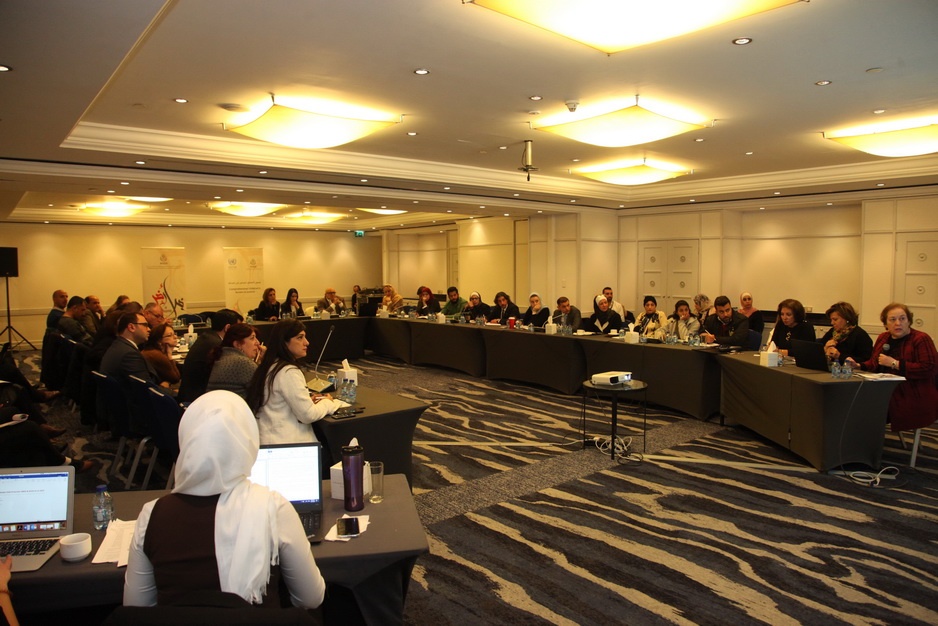Arab Renaissance for Democracy and Development (ARDD) held the roundtable discussion “Child Protection Frameworks in Jordan: Legislative, Social and Educational Measures” on Sunday, December 22, 2019, as part of the “Comprehensive Children’s Access to Justice” implemented within the framework of Protection, legal aid and justice sector development program, in partnership with the United Nations Office for the Coordination of Humanitarian Affairs. Inline of ARDD’s participatory and collaborative strategy, emphasizing on the localization principle the roundtable discussion witnessed the participation of active experts and representatives from civil society and relevant government agencies highlighting priorities that must be considered when implementing child protection programs.
Kicking off the discussion, ARDD’s CEO Samar Muharab gave an overview of the organization’s efforts and experience in the field of the right to education, legal awareness and child protection in Jordan. Followed by Amani Salah, the head of the humanitarian financing unit at OCHA, added that ” The capacity of a local organization to work on Children’s Access to Justice in Jordanas an accomplishment, the level of protection ARDD is offering matches what INGOs offer”.
The event handled four themes. The first of which dealt with the legislative reality of children’s protection, especially those in conflict with the law, those who are at risk, and those with disabilities, alternative measures to juvenile punishment, childhood protection in times of crisis, child labor and trafficking.
Senator Sawsan Al-Majali, considered, that “The high number of relevant legislations in Jordan is a positive and negative thing at the same time, due to the conflicts that might occur between some of these legislations” This theme highlighted children’s best interest and children rights laws, child labor issues among refugees and host communities, as well as human trafficking, and the role of safety shelters in Jordan. CEO of Durrat Al-Manal Development and Training Company, Manal Wazani said, “It is not easy to enroll a child in a new school year, especially while schools suffer overcrowding.”
CEO of Tamkeen Center for Support, Linda Kalash, emphasized that “The child labor age was raised in Jordan from 13 to 16 years”, and that no judicial decision has been issued in Jordan since 2009 in relation to human trafficking except in one case only.
The second theme discussions touched on protection mechanisms and legal support provided to children in terms of counseling, mediation and litigation, the role of the media in child protection, and the importance of strengthening the protection of children with disabilities in Jordan.
The two journalists Nadine Al-Nimri and A. Anas Damra, shared their journalistic experiences covering issues related to childhood and child protection, and the academic integration of children with disabilities. Al-Nimri expressed that “Litigation procedures in Jordan are not child friendly ” and Damra shared with the audience a personal experience which motivated him to support the cause of children of disabilities and shared his latest investigation in this regard.
ARDD’s adv. Rami Qweider, shared information regarding the legal dealings with children and juveniles in Jordan, stressing that “the absence of a specific definition of what child best interest mean hinders the provision of legal services to them.”
The third theme addressed Personal Status Law, Juvenile Law, penalties and cybercrime and its role in achieving protection, in addition to the influential bodies in terms of administrative and judicial procedures, with the importance of child social protection networks and the referral system for targeted children, and the need to provide psychosocial support systems for children who are in conflict with the law, and those at risk, and those with disabilities, stressing the importance of the role of parents and families in protecting these children.
A Naela Al-Sarayrah of the National Council for Family Affairs stated that “the National Council for Family Affairs has been obligated to provide legal aid to children, and that child marriages are being inspected by Minors Affairs Department,” Assistant Ahmed Shehidat, director of the Juvenile Directorate at the Ministry of Social Development, commented that “The Ministry works in partnership with government agencies and other organizations to hand the child over to their guardian in accordance with their conditions while conducting the necessary follow-up with the previous authorities,”
Areej Samreen from the Institute for Family Health Care at Noor Al-Hussein Foundation stated that “There is fine line between personalization and professionalism in psychosocial support that should be identified”.
The fourth them touched on the importance of “Capacity building of the staff working in the justice system and legal and psychosocial support for children and its financial costs” according to Dr. Abeer Al-Braim, from Habak for human rights training and development, who continued to talk about the importance of providing the appropriate infrastructure to advocate for children’s rights and ensuring children’s access to justice, while eliminating class discrimination when dealing with disabled children.
The discussions concluded with a number of recommendations, such as the necessity of concerted efforts to achieve the greatest impact through the work of various partners from government agencies, organizations and others regarding children’s rights, while working to bridge communication gaps between them, and focus on the positive efforts and building on the achievements.


